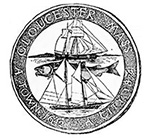
" Next morning, when we came into Gloucester in the Quickstep, there was the Echo lying in the stream and her colors all set, the sassiest- looking little vessel in the whole North Atlantic. The city was just getting warmed up to the thing when we arrived. The newspapers had been full of the seizure down East. England, they said, was trying to crowd us on the fishery laws and the United States was a little slow picking it up, and so the country was boiling over when they heard about the Echo's escape. It was speeches, mass meetings, and editorials all hot and lots of people got a chance to blow off steam. When the Echo was reported escaped, there warn't many ever really thought she'd get by the cutters and the cruiser that was known to be after her. Then there was the three days or so when they didn't know where she was. So all Gloucester came running down to the docks when the word was passed that she was home. ( The Echo's in the Echo's in,' was ringing all over Gloucester like a fire alarm. The Quickstep and Buccaneer, coming in four or five hours afterward, had can- nons fired for 'em as they sailed up the harbor, but that was only the overflow it was the Echo's crew that got it. People came from everywhere to look at the Echo and shake hands with Billie and us. It was Captain William Simms and the darin' crew of the Echo o' the Morn. Yes, sir. They wrote songs about it half a dozen or more and City Hall was lit up and bonfires in the streets in the middle of Main Street, man. And there was parades with red and blue and green lights and all kinds of queer fireworks. One showed the Echo running through a fleet of men-o'-war, every blessed one of 'em blazing broadsides at her and she never losing a spar. For a few days lots of people didn't do a tap of work just stood on the curb-stones and talked about the Echo. Whenever one of us showed up there'd be a rush and we'd have to tell how it happened all over again. We was given the freedom of the city, which meant, as Hiram Whitaker said, that you could go into any bar-room in Gloucester and order all the drinks you wanted and as many times as you wanted and not be allowed to pay for 'em. Hiram cert'nly got drunk that week. There was a purse made up and we got a hun- dred and fifty dollars apiece out of that, besides a good share from the two hundred barrels in her hold, which fetched patriotic prices, everybody wantin' to get hold of some of the Echo's mack- erel. It beat reg'lar fishin' all out. Billie got a big solid silver punch-bowl, and there was smaller bowls for the rest of us, and they gave me a mon- strous big meersh'm pipe, gold mounted, with my name in gold letters on the case. That was for standing by the lights in the dory, they said. And smoke it? h-m-m no more than I'm smoking this one now I wonder how long it's been out. I'm bad as Billie Simms himself. He never could keep a pipe going when he got started talking. When he got goin', he'd forgot who made him man, the imagination he had ! But if somebody'll give me another match and is there anything at all left in that bowl there, Sylvie?"
"Oh, there's a good round left yet, Wesley."
" Enough to sluice out the scuppers with, eh?"
" Just about. And the passenger here wants to know if you'll sing one of the Echo's songs the one they sang at the big banquet. You got time. Just a second now, Wesley, boy. There ! there's one swashing over the rail for you. Here you go, Prentice here's for you, John Harkins, and pass that to the passenger. All you others reach over and get your own, and stand by while Wesley sings. Hold up a second yet draw the curtains there and let in a little light the sun's most up. Might's well open up the windows, hadn't we, and let some of this smoke blow away ? it's as thick as any banker's fo'c's'le on the run home. Smells fine and sweet, that, don't it? It's the last of the sou'wester there'll be mackerel schoolin' after this little blow, fellows. Maybe a full hold for some of us to- day, if cutters don't get too fresh. I swear, but some day we ought to turn, three or four crews of us, and gaff one of them, hah ? and tear 'round down the coast and chase everything that ain't American into harbor when mackerel is school- ing, hah, Wesley ?"
" Ho, but Billie Simms'd be the boy for that, Sylvie. Well, here's a shoot and devil take the cutters no, no, they have that for their work, I s'pose. Here's to fish a plenty for all of you, and to the Echo o' the Morn."
" Drive her, Wesley, drive her," voiced Sylvie for the bunch, " and stand by all hands while Wesley sings
." So Wesley sang. His attitude was character- istic left hand deep in his waistband pocket and right hand gripping his glass ; one shoulder braced to wind'ard and feet well apart, to meet the heave of the deck, evidently ; eyes bent on the lookouts at the forem'st-head and a voice pitched to reach that same forem'st-head with certainty, against a fresh and rising head breeze standing so, as if he were to the wheel, Wesley sang the ballad of the Echo o' the Morn. Twelve or fourteen good stanzas there were, the plain tale of the Echo all over, done into rhyme by a fo'c's'le poet, who must have held in high esteem the vessel and her crew and those very able auxiliaries, " Crump " Taylor and " Soudan " McLeod :
From the loft we took her sails, and bent 'em in the night,
And sailed her out the harbor, with cutters left and right.
Sou 'west by su'the we drove her till the sea was fair aroar,
And we never touched a halyard as to La Have we bore.
On the Echo o' the Morn Lights out and southern courses, let her head come round,
Devil take the British forces, here's the Echo homeward bound.
Crump Taylor towed her seine-boat, Soudan towed her lights,
And the Echo slipped the cruiser in the darkness of the night.


